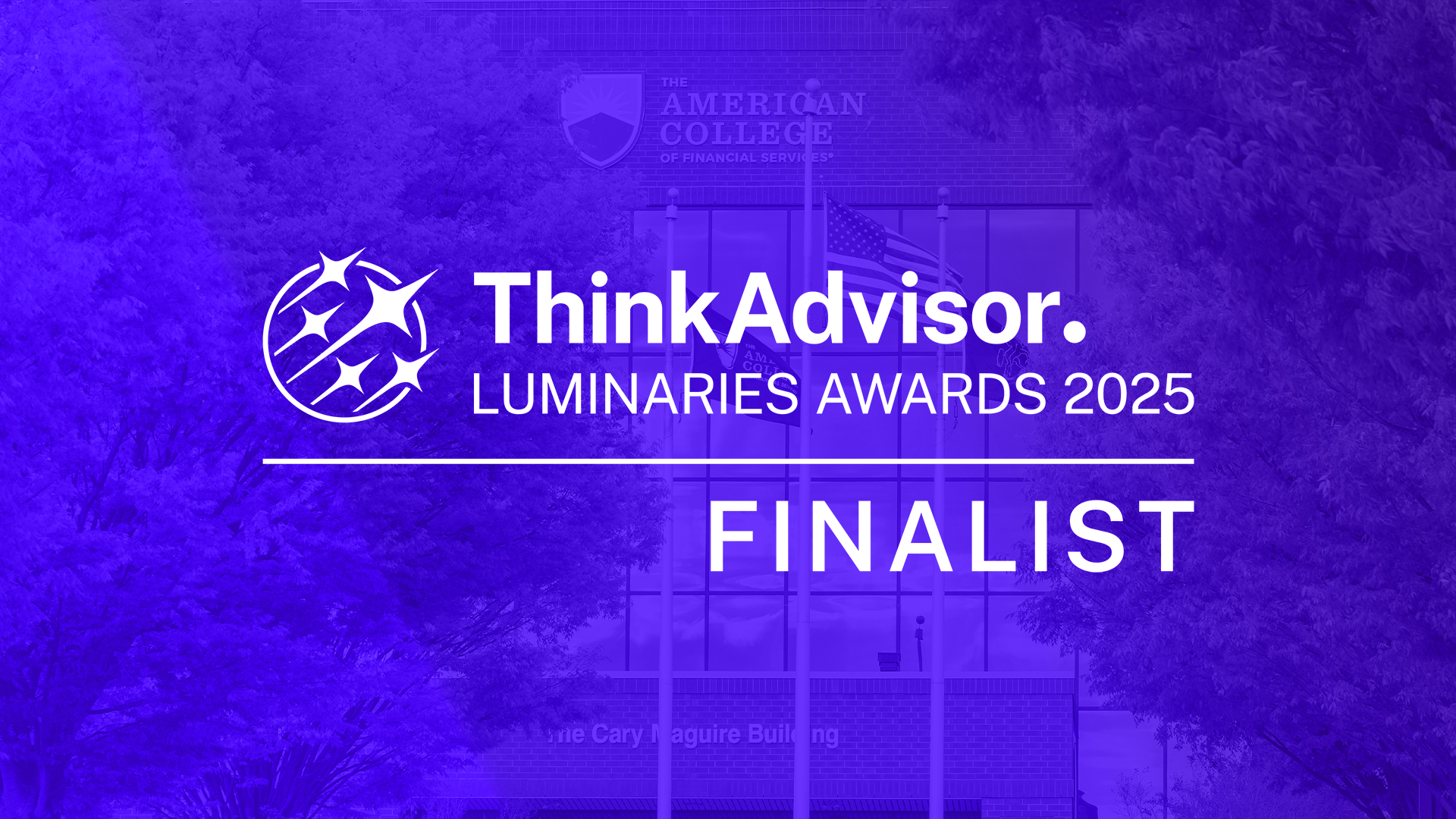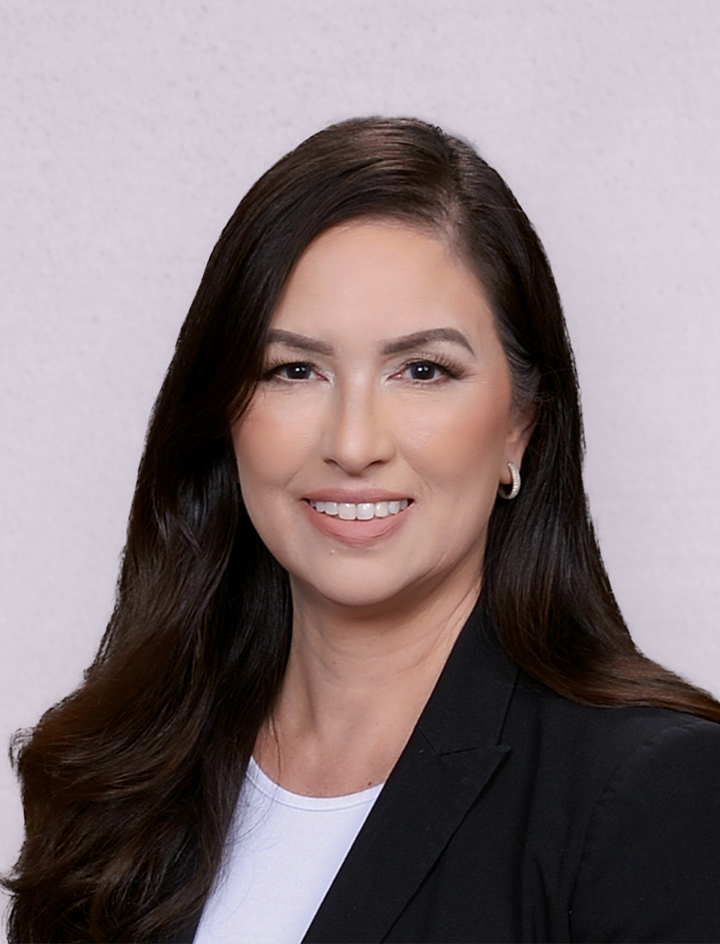Author
Subscribe to Newsletter
Related Posts
INDUSTRY EVENT: AFCPE® Symposium
About The College Press
2025 Luminaries Finalist

KING OF PRUSSIA, Pa. — October 28, 2025 - The American College of Financial Services is a finalist in five categories for the 2025 ThinkAdvisor Luminaries Awards, the most received by any honoree this year. The finalist nominees include individual leadership categories as well as firm-level recognition for thought leadership and industry disruption.
Guided by its mission to uplift the profession and benefit society, The College equips financial professionals with the expertise and resources needed to navigate change and deliver lasting value to those they serve.
“It’s an honor to lead a well-respected institution that continues to provide insight and innovation — and it’s also an honor to be recognized alongside my colleagues as a leader in the financial space,” said George Nichols III, CAP®, president and CEO of The American College of Financial Services and finalist in the CEO category. “This recognition is about more than just the awards. It’s about pursuing excellence in service to the thousands of advisors we educate each year who go on to strengthen families, businesses, and communities.”
The ThinkAdvisor Luminaries Awards celebrate outstanding achievements by firms and individuals who demonstrate innovation, leadership, and a commitment to excellence in financial services. The College and its leaders have been recognized as finalists in the following categories:
- Firm Award: Industry Disruption
- Firm Award: Product or Service Innovation
- Firm Award: Thought Leadership and Education
- Individual Award: CEO of the Year (George Nichols III, CAP®)
- Individual Award: CMO of the Year (Jared Trexler)
“These nominations reflect the incredible breadth of work happening at The College,” said Jared Trexler, senior vice president and chief marketing and strategy officer. “This recognition speaks to the collaborative work of our faculty, staff, and leadership, all united by the belief that applied financial knowledge can transform both careers and communities.”
Founded in 1927, The American College of Financial Services is about to head into its second century of being at the forefront of financial education and advancement for professionals. The College provides designations, certifications, and graduate degrees that serve professionals across every stage of their careers. Its faculty and research centers are leading experts in areas such as retirement income planning, wealth management, insurance, and philanthropy.
The 2025 ThinkAdvisor Luminaries winners will be announced at the 5th Annual Luminaries Awards Gala in New York City on Dec. 4.
For more details and the full list of finalists, visit ThinkAdvisor Luminaries Awards.
About The American College of Financial Services
The American College of Financial Services is the nation’s largest nonprofit and accredited educational institution devoted to financial services professionals. Nearly one in five advisors or agents is an alum of The College. The College offers a learning platform that includes professional designation, certification, and degree programs and encompasses early-career foundational knowledge as well as deep, specialized education in tax, retirement income, philanthropy, risk management, and more with the highest-quality combination of rigor and relevance. The College’s faculty represents the foremost thought leaders in the financial services industry. Its educational programs, research, and events offer professionals the opportunity to accelerate through knowledge, grow through connections, and uplift through community.
Visit TheAmericanCollege.edu to discover how you can gain expertise for every stage.
Methodology
The ThinkAdvisor Luminaries Awards are judged by a distinguished panel and the publication’s editorial team, who evaluate nominations from across the financial services industry. Finalists are selected based on demonstrated leadership, innovation, and community impact. Key criteria include both quantitative and qualitative results, such as the number of advisors and clients affected, the creativity of the solutions introduced, and the measurable influence on firms, professionals, and the industry at large. Judges also assess nominees’ ability to achieve goals, display ingenuity, and uphold the highest ethical standards while serving the best interests of clients. Each nomination highlights 3–5 examples of achievements from the past 12–18 months, supported by materials that reflect the nominee’s commitment to excellence, advisor development, and industry advancement.
About The College Research
Onboarding Gen Z

Within the next decade, 37% of today’s advisors are expected to retire, leaving behind a critical need for new talent.1 As seasoned professionals move up the ranks into vacated roles, firms and prospective new professionals — especially Gen Zers — are uniquely positioned to help bridge the talent gap.
To meet the demand for financial services professionals and replace talent lost to retirement and turnover, the industry will need to attract an estimated over 740,000 new hires over the next decade.2 But first, the industry and firms need a better understanding of Gen Z’s career motivations and expectations to successfully attract and retain them.
We surveyed over 1,200 Americans ages 18 to 27 — including undergraduate college students and recent college graduates interested in financial services, as well as early-career professionals already working in the industry — about their expectations, motivations, and experiences in financial services. The findings provide a roadmap for industry leaders seeking to grow their teams.
Want more insights on this topic?
Check out this interview with College President and CEO George Nichols III, CAP®.
Key Findings
According to the CFA Institute, Gen Zers consider finance their top industry choice.3 While a large portion of Gen Z may be eager to launch their careers in financial services, many say their early workplace experiences fall short. The College’s Onboarding Gen Z Study4 reveals:
- 1 in 3 Gen Zers feel their workplace onboarding is ineffective
- 1 in 4 Gen Zers feel their workplace training is ineffective
- 1 in 4 Gen Zers feel job expectations are unclear
These early experiences shape how the next generation of professionals views opportunity, workplace culture, and long-term growth in the industry. Notably, Gen Zers with financial services education, certifications, or internship experience report feeling far more prepared to succeed. This underscores the importance of enhancing recruiting, interviewing, and onboarding processes with clearer expectations and stronger support — ultimately making a meaningful difference for both employees and firms.
Taken together, the findings reveal a generation that’s driven, adaptable, and eager to lead, but looking for clearer guidance and stronger support as they launch their careers. Explore the full study to see what today’s emerging professionals value most, and how firms can better attract and retain Gen Z talent.
More Research From The College
- Gain insights for uncertain markets with our Advising Through Uncertainty Study
- See key takeaways from our Retirement Income Literacy Study
- Learn why comprehensive financial planners have an edge with clients in the Advisory Services Survey
Retirement Planning Insights
Navigating College Costs and Retirement Savings

College has never been more expensive, with annual costs averaging nearly $60,000 at private institutions and even public institutions topping $27,000 a year.1 For many families, those numbers aren’t just daunting — they redefine how parents think about their long-term financial goals.
With tuition costs rising and student debt reaching record highs, parents are under increasing pressure to support their children’s education without compromising their own financial security. Recent updates made under the One Big Beautiful Bill Act (OBBBA) are also changing the landscape of education savings and planning, including new flexibility for 529 plans and other funding options.
Understanding these shifts, and how to integrate them into broader financial strategies, can help advisors guide parent clients through investing in their children’s futures and protecting their own.
What Do Recent 529 Plan Updates Mean for Advisors and Families?
A 529 plan is a tax-advantaged vehicle designed to help families save for educational expenses, covering anything from K-12 education to student loan repayment. There are two main types of 529 plans:
- College savings plans, which allow funds to grow based on the performance of the underlying portfolios
- Prepaid tuition plans, which let families lock in tuition rates at participating institutions
For most families, the savings plan is the preferred option for its flexibility, investment options, and ability to adapt as circumstances evolve.
In recent years, legislative changes, including updates under the OBBBA, have made 529 plans more flexible than ever. No longer limited to just college tuition and fees, the law broadens what qualifies as an eligible expense under these savings plans, now including a wider range of K-12 costs like tutoring, educational materials, and testing fees. It also expands coverage to professional certifications and workforce training programs, recognizing that education today extends far beyond traditional four-year college.
For advisors, this expanded versatility is an opportunity to take a fresh look at how 529 plans fit into clients’ overall financial plans. Rather than treating education savings as a separate bucket, advisors can help integrate 529 strategies into estate and tax planning. That means making sure contributions and withdrawals align with tax rules, setting realistic savings targets, and adjusting plans as family goals or financial circumstances change.
In doing this, advisors can help clients make the most of their savings plans while still focusing on the bigger picture of their financial future.
Balancing Education Funding and Retirement Planning
The OBBBA’s updates may offer families more flexibility, but they don’t solve one of the most persistent financial challenges for parents: balancing their children’s education costs with their own retirement goals. Even with new planning opportunities, many families still face the difficult question of how to divide limited savings between college funds and long-term security.
Advisors play a pivotal role in guiding these difficult conversations. By helping clients identify their priorities and model different scenarios that show the trade-offs, advisors can demonstrate the long-term impact of their decisions. What happens if college savings are prioritized too heavily, or if retirement contributions are delayed too long?
For many parent clients, the most sustainable approach begins with securing their retirement first, then contributing what they can toward a 529 plan or other education savings once a safety net is in place. It’s important to remember that while there are many paths children can take to receive college funding, like loans, scholarships, and grants, parents have far fewer alternatives for financing retirement.
To help clients find balance, advisors can implement what experts call the “Y.E.S.” order of operations:
- You: prioritizing saving for retirement and building an emergency fund first
- Education Savings Accounts: contributing to 529 plans or other education savings accounts only when retirement savings are on track
- Savings: creating savings accounts for non-educational expenses, like first homes, weddings, and other life events
Balancing the reality of a parent client’s financial situation with their desire to support their children can be complicated. Parents may feel torn between helping with college expenses and staying on track with their own financial security. Studies show that nearly six in ten Americans have delayed retirement due to these competing financial goals.2 Yet without sufficient retirement savings, the financial burden can eventually fall back to their children.
Advisors can help clients avoid this outcome by framing the conversation around long-term balance. By leveraging the new opportunities under the OBBBA and modeling how different savings strategies affect both education and retirement outcomes, advisors can empower clients to make informed decisions. In doing so, advisors can position families for success across generations, ensuring that parents and children alike have the financial foundation to pursue their futures confidently.
More on Retirement Planning
- Get insights on financial literacy from the Retirement Income Literacy Study
- Give your clients the gift of knowledge with a free education program, The Retirement Course®
- Become a retirement expert with our Retirement Income Certified Professional® (RICP®) Program

EA, NSSA®, CTRS, TPCP®, AFSP, CETF®
Subscribe to Newsletter
Related Posts
The Future of Advice
View DetailsTax Planning Podcasts
Taxes Estate Planning, and OBBBA
In this episode of the Shares podcast, College Professor of Practice Steve Parrish joins fellow instructor Mark McLennon for a deep dive into the tax planning and estate planning implications of the OBBBA. They cover the see-sawing history of tax policy in legislation, what provisions are out and in this time around, and the at times profound financial planning impacts that this latest incarnation of tax policy can have on estate planning and other elements of planning impacted by tax laws.
Steve Parrish, JD, RICP®, CLU®, ChFC®, AEP®, is a professor of practice and a scholar in residence at The American College of Financial Services’ Cary M. Maguire Center for Ethics in Financial Services, where he also serves as an adjunct professor of advanced planning. He joined the College in 2015, previously serving on the faculty of Drake University Law school where he was an adjunct professor of estate planning and interim director of the Compliance and Risk Management Department. Drawing on more than 45 years’ experience with companies such as The Principal Financial Group, Amerus Life Insurance Company, and his own advisory firm, Parrish is a recognized industry authority, spokesperson, and author. He continues to serve as an ongoing contributor for both Forbes.com and ReThinking65.com, is a contributing author to the 2023 e-textbook Retirement Plans and Retirement Planning, and will be the co-author of The Tools & Techniques of Life Insurance Planning, 10th Edition.
Mark McLennon, JD, CLU®, ChFC®, CFP®, CPA/PFS, is an assistant professor of tax and estate planning at The American College of Financial Services within the CFP® Certification Education and Chartered Financial Consultant® (ChFC®) programs. His private practice experience includes serving as a consultant in the tax division of Arthur Andersen & Co. in Chicago and as an attorney in the estate planning group of a large Milwaukee law firm. After several years as an advanced planning attorney for Allstate, Mark took on a similar role at Northwestern Mutual. In his more than two decades with the company, he was responsible for growth in the firm’s investment advisory and trust business, oversight of the fee-based financial planning program, personal trust administration, and wealth management advisor training. He also played a key role in numerous enterprise-level initiatives, including the development of life insurance products for the estate planning market, as well as the implementation of trust and private client services.
Any views or opinions expressed in this podcast are the hosts’ and guests' own and do not necessarily represent those of The American College of Financial Services.
More on Tax and Estate Planning
- Learn more about the tax implications of the OBBBA
- Get specialized knowledge in tax planning with the Tax Planning Certified Professional® (TPCP®) designation
- Get more insights into estate planning with the Retirement Income Certified Professional® (RICP®) designation

MPA, CAP®

PhD, CFP®, CLU®, CTP
Ethics In Financial Services Insights
Rethinking Support for the Advisor Shift

The American College Cary M. Maguire Center for Ethics in Financial Services and the American College Center for Women in Financial Services partnered with InvestmentNews on September 23 to host the webcast, “The Advisor Shift: Rethinking Strategic Support for the Workplace of the Future,” which explored how firms can better attract, support, and retain the next generation of advisors.
Moderated by Kaylee Ranck, PhD, director of the Office of College Research, the session featured insights from Azish Filabi, JD, MA, managing director of the Center for Ethics in Financial Services, and Lindsey Lewis, MBA, ChFC®, CFP®, managing director and chair of the Center for Women in Financial Services. Together, they discussed the changing landscape of the industry with a focus on Gen Z’s career motivations and expectations.
The webcast examined what motivates Gen Z to pursue careers in financial services, the barriers they face early in their careers, and how firms can adapt to meet their expectations. Findings from the study revealed that competitive pay, work–life balance, and a sense of purpose are top motivators, while unclear career pathways, lack of training, and communication gaps often create friction.
Drawing from the Center for Ethics in Financial Services’ recent “Voices from the Field: Ethics Challenges in Financial Advisory Practices” research, Filabi highlighted how conflicts of interest tied to compensation structures, inconsistencies around fiduciary duty, and the constraints of proprietary products shape the ethical challenges advisors encounter early in their careers.
The webcast highlighted how aligning incentives, governance, and mentorship can help firms reduce ethical dilemmas and strengthen client trust.
More on Supporting the Advisor Shift
- Watch the on-demand webcast to discover how fostering ethics and transparency can strengthen advisor development and long-term trust The Advisor Shift: Rethinking Strategic Support for the Workplace of the Future.
- Download the full Voices from the Field report to explore the findings and gain critical insights on how financial advisors navigate trust in practice management.